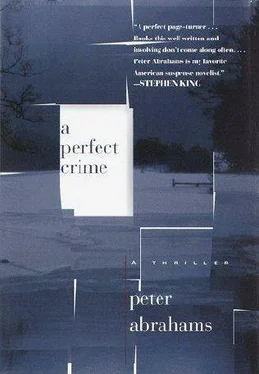Peter Abrahams - A Perfect Crime
Здесь есть возможность читать онлайн «Peter Abrahams - A Perfect Crime» весь текст электронной книги совершенно бесплатно (целиком полную версию без сокращений). В некоторых случаях можно слушать аудио, скачать через торрент в формате fb2 и присутствует краткое содержание. Жанр: Триллер, на английском языке. Описание произведения, (предисловие) а так же отзывы посетителей доступны на портале библиотеки ЛибКат.
- Название:A Perfect Crime
- Автор:
- Жанр:
- Год:неизвестен
- ISBN:нет данных
- Рейтинг книги:4 / 5. Голосов: 1
-
Избранное:Добавить в избранное
- Отзывы:
-
Ваша оценка:
- 80
- 1
- 2
- 3
- 4
- 5
A Perfect Crime: краткое содержание, описание и аннотация
Предлагаем к чтению аннотацию, описание, краткое содержание или предисловие (зависит от того, что написал сам автор книги «A Perfect Crime»). Если вы не нашли необходимую информацию о книге — напишите в комментариях, мы постараемся отыскать её.
A Perfect Crime — читать онлайн бесплатно полную книгу (весь текст) целиком
Ниже представлен текст книги, разбитый по страницам. Система сохранения места последней прочитанной страницы, позволяет с удобством читать онлайн бесплатно книгу «A Perfect Crime», без необходимости каждый раз заново искать на чём Вы остановились. Поставьте закладку, и сможете в любой момент перейти на страницу, на которой закончили чтение.
Интервал:
Закладка:
“A nice fit?”
“On the court. You’re in the finals, after all.”
“Anne’s a good player.”
He poured another glass of water, started for the door that led to his basement room, stopped with his hand on the knob. “Her husband’s coming, too,” he said. “I didn’t quite catch his name.” He paused, his back to her. “Fred, is it?”
“Ned.”
That surprised him. He’d expected something craven: “I’m not sure” or “Ned, I believe.” Surprised him and infuriated him. He went downstairs without another word.
Roger sat by the glassed-in window in the spectators’ gallery off the bar, overlooking court one. On the court, the umpire was already in her chair, and the players were warming up their serves. He studied them one by one. First, the opposition: a stocky woman with an uncoordinated service motion, each component slightly mistimed, and a thinner one with better form but little power. Then he turned to Francie and her partner: Francie had improved her serve since he’d last seen her play, years before; she’d perfected her slide step, now got her legs nicely under the ball, hit it hard. And her partner, Anne: a delicate-looking woman, she reminded him of a Vassar girl he’d dated long ago, his only serious girlfriend before Francie. Anne had the best form of all, but she wasn’t putting a single serve in the court. He leaned forward, trying to figure out why, at the same time hearing the gallery-there was room for fifteen or twenty people, no more-fill around him, hearing Francie’s name mentioned more than once. He should have been prepared, but was not, for that smooth voice.
“This seat taken?”
He turned to face radio boy. “No.”
“Thanks.” Radio boy sat down beside him. He held up crossed fingers. “My wife’s playing for all the marbles.”
“So is mine,” said Roger.
Radio boy looked down at the court. “Which one is she?”
Roger pointed her out.
“Oh, Francie,” said radio boy. “I met her the other night-when Anne twisted her ankle.” He held out his hand. “Ned Demarco.”
Smooth, smoother even than Francie. Roger had no choice but to shake his hand, hand that had been all over his wife. “Roger Cullingwood.”
“Nice to meet you, Roger. Let’s hope we bring them a little luck.”
Roger smiled, a smile that spread and spread, almost culminating in that laughing bark. But he held it in and said, “There’s no luck in tennis.”
“Heads,” said Francie. The coin spun in the air, bounced on the court. The umpire bent over it.
“Tails,” she said.
Francie and Anne touched racquets, moved back to return serve, Anne in the deuce court, Francie in the ad. “How’s the ankle?” Francie said.
“I feel fine.”
But she didn’t look fine: her face was colorless, except for the mauve depressions under her eyes, and the eyes themselves couldn’t meet Francie’s gaze.
“Hungry?” said Francie.
“No.”
“Me either,” said Francie. She glanced up into the gallery, saw Roger and Ned side by side, talking. Even though she hadn’t been able to derail Anne’s dinner plans, had prepared herself for the possibility that they might sit together, she wasn’t prepared. She swung her racquet a few times, tried to make her arm feel long. “Let’s work up a fucking appetite,” she said.
Anne smiled, a smile barely there, quickly gone. Was she about to burst into tears? What the hell was going on? Tennis, Francie. Just watch the ball.
The server tucked one ball under her skirt, held up the other-“Play well,” Francie said-and served. Not a hard serve, not deep in the box, on Anne’s forehand. By now Francie had seen Anne do many good things with a serve like that-the crosscourt chip, the lob into the corner, the down-the-line putaway. She had never seen her jerk it ten feet wide, never seen her hit with such a tight, awkward motion. A little spot of color appeared on Anne’s cheek.
“Sorry,” she said, not for the last time.
“Not a problem,” Francie said, also not for the last time.
When the match ended an hour and fifteen minutes later, the red spot had spread all over Anne’s face, down her neck, vanishing beneath her collar. But Francie had stopped seeing that bright redness, stopped hearing the “sorry’s,” stopped saying encouraging little things, stopped noticing Anne’s double faults, unforced errors, mishits, blocked all that right out. Blocked out everything in her life as well-Ned, Roger, the cottage. She just played, forgot her life and played as she had never played before: winning her serve at love in almost every game, hitting winners from all over the court, making shots she seldom even attempted, topspin lobs from both sides, inside-out forehands, backhand overheads. Everything went in. At the same time she learned that Vince Lombardi had been wrong, that winning wasn’t the only thing, or everything-it was nothing. All that mattered was hitting that ball on the goddamn nose, again and again and again; pounding, booming shots that never came back. The sound of the ball off her racquet was frightening. They lost 4–6, 4–6.
The umpire handed out trophies, big ones for the winners, little ones for Francie and Anne. The winners stayed on the court to have their pictures taken. Anne, her face now draining of blood and as blank as a shell-shocked soldier’s, went into the locker room, Francie behind her.
A fancy locker room, with whirlpool, sauna, steam, all deserted on a Saturday night. Francie started to lay her hand on Anne’s shoulder, held back. What to say? All she could think of was “Jacuzzi?”
“In a minute,” said Anne, not looking back at her. Anne turned down the row that led to her locker; Francie moved on to hers.
She sat on a stool without stirring for a minute or two, the muscles in her legs tingling, a human version of the hum of idling machines. She felt great. What other potentials were locked up in her? The potential for love had already been freed by Ned, and others still inside probably had to do with the children she’d never had and never would. She felt less great.
Francie stripped off her clothes, opened her locker, put on the faded maillot hanging inside. The whirlpool was at the back of the locker room, near the showers. She switched on the timer, got in, closed her eyes, and had a crazy idea almost at once: Why not just take off for somewhere far away, by herself? The Atlas Mountains, Prague, Mombasa. She’d driven through the Atlas Mountains years ago with Brenda, stoned on kif-that many years ago-remembered robed Berber children holding up chunks of amethyst by the roadside, stunted magicians performing their purple tricks. Why couldn’t Francie opened her eyes. Had she heard something over the sound of the bubbles? She twisted the timer down to zero, listened, heard it again, then got out of the whirlpool and followed the sounds to Anne’s locker.
Anne was sitting on a stool, her back to Francie. She was wrapped in a towel, her head in her hands, her shoulders shaking.
“Anne?”
No reply, just her sobbing, full-throated and ragged. Francie moved around in front of her. “Anne. Please. It’s only tennis.”
Anne looked up, tears streaming down her splotchy face, snot, too: misery undisguised. “It’s not the tennis, Francie. I-” The sobbing took over. Her towel slipped, exposing her breasts, but she didn’t notice. Francie couldn’t help noticing, even at that moment couldn’t help comparing them to her own: the two pairs of breasts in Ned’s life.
“Please, Anne.” Francie touched her shoulder. “Everything’s all right.”
At her touch, Anne fell forward, grabbed Francie around the waist, clung to her, her wet face against Francie’s wet bathing suit. “Help me, Francie.”
Читать дальшеИнтервал:
Закладка:
Похожие книги на «A Perfect Crime»
Представляем Вашему вниманию похожие книги на «A Perfect Crime» списком для выбора. Мы отобрали схожую по названию и смыслу литературу в надежде предоставить читателям больше вариантов отыскать новые, интересные, ещё непрочитанные произведения.
Обсуждение, отзывы о книге «A Perfect Crime» и просто собственные мнения читателей. Оставьте ваши комментарии, напишите, что Вы думаете о произведении, его смысле или главных героях. Укажите что конкретно понравилось, а что нет, и почему Вы так считаете.












